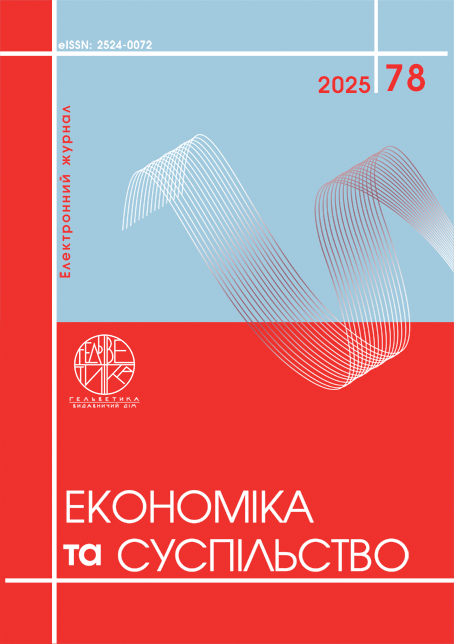DIGITAL EMOTIONAL INTELLIGENCE AS A MANAGERIAL COMPETENCE
Abstract
The rapid digitalization of business processes is reshaping managerial competencies and redefining leadership effectiveness. While digital technologies provide broader opportunities for communication, they also generate challenges for sustaining emotional connections between managers and employees in remote and hybrid teams. Emotional intelligence (EI) has been widely studied as a key predictor of leadership success; however, existing approaches remain insufficient to explain competencies required in digitally mediated environments. This article aims to conceptualize digital empathy as a distinct component of emotional intelligence and to analyze its role in reducing the risks of burnout and social isolation in virtual teams. It further seeks to evaluate existing tools for assessing EI and propose methodological directions for adapting them to digitalized HRM contexts. The study applies a conceptual and comparative approach. It synthesizes existing theoretical models of EI, critically reviews established assessment instruments such as the Mayer-Salovey-Caruso Emotional Intelligence Test (MSCEIT), EQ-i 2.0, and 360-degree feedback, and contrasts them with the emerging requirements of digital work environments. The paper introduces digital empathy as an analytical category and outlines its operationalization through content analysis of digital communication, behavioral analytics, and adapted 360-degree instruments. The results suggest that digital empathy functions as a managerial buffer against emotional risks in remote work, enhances psychological safety, and promotes team engagement. Classical instruments of EI measurement remain valuable but do not capture the nuances of digitally mediated emotional signals. New integrative frameworks are required to measure leaders’ ability to interpret and respond to emotions expressed in virtual interactions. The study contributes to the academic discourse by advancing the concept of digital emotional intelligence as a managerial competence essential for HR digitalization. It provides practical recommendations for integrating EI into HRM platforms and leadership development programs, emphasizing that cultivating digital empathy strengthens trust, productivity, and organizational resilience. Future research should empirically validate digital empathy and explore its relationship with digital leadership and sustainable HR practices.
References
Salovey, P., Mayer, J. D. Emotional Intelligence. Imagination, Cognition and Personality. 1990. Vol. 9. № 3. P. 185–211.
Goleman, D. Emotional Intelligence: Why It Can Matter More Than IQ. New York: Bantam Books, 1995. 352 p.
Захарченко Г. М. Емоційний інтелект: теорія та практика: монографія. Київ : Ліра-К, 2018. 212 с.
Титова Т. А., Бухановська Т. М. Професійне вигорання та методи його подолання. Український медичний часопис. 2024. № 1680 (3051). С. 259–310.
Mayer, J. D., Salovey, P., Caruso, D. R. Mayer-Salovey-Caruso. Emotional Intelligence Test (MSCEIT). Toronto: Multi-Health Systems, 2002. 128 p.
Peters, L. EQ-i 2.0: the new standard in emotional intelligence assessment. Psychology Today. Chicago, 2016. URL: https://www.psychologytoday.com/articles/eq-i-20 (дата звернення: 05.08.2025).
Гуцан О. М., Локтіонова Т. П., Есенов Д. Е. Метод «360 градусів» як сучасна тенденція в оцінці персоналу. Стратегії інноваційного розвитку економіки України: проблеми, перспективи, ефективність: зб. тез наук. конф., м. Харків: НТУ "ХПІ", 2015. С. 9–11.
Salovey P. , Mayer J.D. (1990) Emotional Intelligence. Imagination, Cognition and Personality, vol. 9 (3), pp. 185–211.
Goleman D. (1995). Emotional Intelligence: Why It Can Matter More Than IQ. New York: Bantam Books, 352 p.
Zakharchenko H. (2018). Emotsiinyi intelekt: teoriia ta praktyka [Emotional intelligence: theory and practice]. Kyiv: Lira-K, 212 p.
Tytova T., Bukhanovska T. (2024). Profesiyne vyhorannia ta metody yoho podolannia [Burnout and methods of overcoming it]. Ukrainskyi medychnyi chasopys, vol. 1680 (3051), pp. 259–310.
Mayer J., Salovey P., Caruso D. (2002). Mayer-Salovey-Caruso Emotional Intelligence Test (MSCEIT). Toronto: Multi-Health Systems.
Peters L. (2016) EQ-i 2.0: the new standard in emotional intelligence assessment. Psychology Today. URL: https://www.psychologytoday.com/articles/eq-i-20 [accessed August 5, 2025].
Hutsan O., Loktionova T., Esenov D. (2015). Metod "360 hradusiv" yak suchasna tendentsiia v otsintsi personalu [The “360-degree” method as a modern trend in personnel assessment]. Stratehii innovatsiinoho rozvytku ekonomiky Ukrainy: problemy, perspektyvy, efektyvnist. Kharkiv: NTU "KhPI", pp. 9–11.

This work is licensed under a Creative Commons Attribution 4.0 International License.


